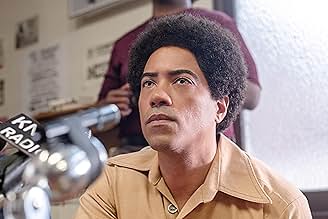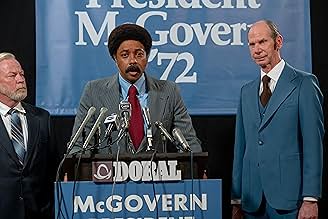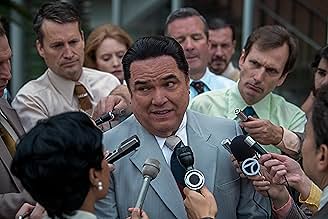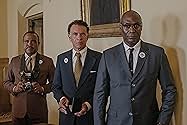PUNTUACIÓN EN IMDb
6,2/10
3,4 mil
TU PUNTUACIÓN
Shirley Chisholm se presenta a la candidatura presidencial demócrata de 1972 tras convertirse en la primera mujer negra elegida para el Congreso.Shirley Chisholm se presenta a la candidatura presidencial demócrata de 1972 tras convertirse en la primera mujer negra elegida para el Congreso.Shirley Chisholm se presenta a la candidatura presidencial demócrata de 1972 tras convertirse en la primera mujer negra elegida para el Congreso.
- Premios
- 3 premios y 12 nominaciones en total
Dorian Missick
- Ron Dellums
- (as Dorian Crossmond Missick)
Charlene Willis
- Ruby St. HIl
- (as Charlene R. Willis)
Reseñas destacadas
Shirley's greatest strength is how it shines a light on an underappreciated and pivotal figure in American history whilst emphasising her perseverance. However, it remains frustrating to see these fact based stories told in such a conventional fashion as it would feel like a straight to TV film if it wasn't for the star studded cast.
Regina King gives it her all, embodying Shirley's resilience in a way that carries the film. Terrence Howard and Lucas Hedges do a fine job in their supporting roles and it's a gift to still get to see Lance Reddick being this good in films a year after he passed. It's a true testament to his commitment and work ethic.
John Ridley's direction is mostly fine. Nothing stands out and he's content to let the performances take centre stage. The only aspect that is noticeable is the lighting, which becomes really distracting as it goes along because so many scenes are overly exposed in a way that makes it feel cheap.
Regina King gives it her all, embodying Shirley's resilience in a way that carries the film. Terrence Howard and Lucas Hedges do a fine job in their supporting roles and it's a gift to still get to see Lance Reddick being this good in films a year after he passed. It's a true testament to his commitment and work ethic.
John Ridley's direction is mostly fine. Nothing stands out and he's content to let the performances take centre stage. The only aspect that is noticeable is the lighting, which becomes really distracting as it goes along because so many scenes are overly exposed in a way that makes it feel cheap.
As "Shirley" (2024 release; 118 min) opens, we are reminded that Brooklyn's Shirley Chisholm was the first Black woman elected to the US Congress, in 1966, among a sea of white males newcomers. We then go to "December, 1971" as Chisholm decides to run for the US presidency in a crowded field and with little chance of actually winning.... At this point we are 10 minutes into the movie.
Couple of comments: this is the latest from writer-director John Ridley (best known for his script for "12 Years A Slave"). Here he looks back at what basically amounts to a footnote in US political history. Question: who was the first Black woman elected to US Congress? Answer: Shirley Chisholm. Question: who was the first Black woman to run for president? Answer: Chisholm again. This film focuses solely on her 1972 presidential run, and hence this is NOT a biopic of Shirley Chisholm. We are given no background or context, none whatsoever, on how this woman got elected to Congress in the first place, or what she did in Congress. As to the movie itself, it struggles to get off the ground, although there are some good moments, in particular towards the end. The movie benefits enormously from the strong lead performance by Regina King ("If Beale Street Could Talk"). Lucas Hedges plays Robert, a national student representative. Bottom line is this: we all know the outcome of Chisholm's 1972 presidential run before we even watch this, so the assumption is that we watch this for the journey, rather than the end result. Turns out that journey isn't all that interesting, even if the concept itself (a Black woman running for president? In 1972? She is DEACDES ahead of her time) is momentous. I'd rather have watched and learned how Chisholm raised to prominence to begin with by getting elected to Congress in the first place. As a complete aside, I must point out that significant chunks of the movie were filmed in Cincinnati (where I live), standing in once again for New York of the 1960-70s (see also Todd Haynes' "Carole"). Also this: couldn't the film makers come up with a sharper movie title than the lame and generic "Shirley"?
"Shirley" received a one week limited theatrical run in Mid-March and then starting streaming on Netflix last week. "Shirley" is currently rated a respectable 70% Certified Fresh on Rotten Tomatoes. That feels a little high to me. "Shirley" is well-meant, for sure, but I'd rather have watched a biopic of this barrier breaking woman. If you have any interest in politics, I'd readily suggest you check this out, and draw your own conclusion.
Couple of comments: this is the latest from writer-director John Ridley (best known for his script for "12 Years A Slave"). Here he looks back at what basically amounts to a footnote in US political history. Question: who was the first Black woman elected to US Congress? Answer: Shirley Chisholm. Question: who was the first Black woman to run for president? Answer: Chisholm again. This film focuses solely on her 1972 presidential run, and hence this is NOT a biopic of Shirley Chisholm. We are given no background or context, none whatsoever, on how this woman got elected to Congress in the first place, or what she did in Congress. As to the movie itself, it struggles to get off the ground, although there are some good moments, in particular towards the end. The movie benefits enormously from the strong lead performance by Regina King ("If Beale Street Could Talk"). Lucas Hedges plays Robert, a national student representative. Bottom line is this: we all know the outcome of Chisholm's 1972 presidential run before we even watch this, so the assumption is that we watch this for the journey, rather than the end result. Turns out that journey isn't all that interesting, even if the concept itself (a Black woman running for president? In 1972? She is DEACDES ahead of her time) is momentous. I'd rather have watched and learned how Chisholm raised to prominence to begin with by getting elected to Congress in the first place. As a complete aside, I must point out that significant chunks of the movie were filmed in Cincinnati (where I live), standing in once again for New York of the 1960-70s (see also Todd Haynes' "Carole"). Also this: couldn't the film makers come up with a sharper movie title than the lame and generic "Shirley"?
"Shirley" received a one week limited theatrical run in Mid-March and then starting streaming on Netflix last week. "Shirley" is currently rated a respectable 70% Certified Fresh on Rotten Tomatoes. That feels a little high to me. "Shirley" is well-meant, for sure, but I'd rather have watched a biopic of this barrier breaking woman. If you have any interest in politics, I'd readily suggest you check this out, and draw your own conclusion.
Congresswoman Shirley Chisholm (Regina King), the first African-American woman elected to the House of Representatives, was an inspiring, trailblazing politician, particularly in the areas of race and gender politics. After winning her seat in Congress in 1968, she later went on to run for the Democratic Party nomination for President in 1972. And that impressive background, one would think, should provide the basis for an engaging, uplifting film biography. Unfortunately, writer-director John Ridley's take on this groundbreaking, often-unappreciated pioneer misses the mark in a number of ways. The biggest problem is a script that tries to cover too much ground in its 1:58:00 runtime, addressing an array of elements from Chisholm's personal and political life and not covering either area particularly well, most notably in the film's first half before settling down in the picture's back end. The narrative jumps around so much that the picture becomes choppy and unfocused - almost incoherent at times - primarily due to some inexplicably mystifying film editing and a lack of sufficient explanation and back story, especially for those who may not know much about the protagonist's life going in. The film also features some rather questionable casting choices, such as the selection of actor W. Earl Brown to portray Alabama Governor George Wallace, who neither looks nor sounds anything like the conservative Southern Democrat who also ran for President in 1972 and was subsequently shot during the campaign. Even King's performance is somewhat uncharacteristically lacking as she struggles mightily to definitively capture Chisholm's singular demeanor and vocal inflections, qualities that sometimes don't always resonate, despite the actress's strong physical resemblance to her character. The real standout here is Lance Reddick, who gives one of his career's best portrayals (as Chisholm's political mentor) in one of his last screen performances. It's disappointing that this inspirational social and political leader hasn't received the worthy cinematic tribute she truly deserves. Perhaps "Shirley" might have worked better as a miniseries than as a standalone vehicle, as that format likely would have provided a better option for more fully telling her story in all of the detail it seeks to depict here. Indeed, for someone who endeavored to rise up to the challenges she faced, it's disheartening that the film seeking to depict that effort doesn't match what she so earnestly sought to accomplish.
This is a biopic of Shirley Chisholm (Regina King). In 1968, she became the first black woman to be elected to the United States Congress. The former school teacher is dismissed and told to wait her turn. She decides to run for President in 1972.
This is a straight biopic. I don't think that a failed run to a Democratic nominee who got destroyed by Nixon is actually that compelling of a story. The most compelling aspect is her marriage. That could be something there. The movie does something similar with the sister, but it's not set up well enough. Maybe a flashback with the father would help. The actors are great. The movie needs more imagination. It needs a better entry point. Barbara Lee could be that doorway. The movie could be told from her point of view.
This is a straight biopic. I don't think that a failed run to a Democratic nominee who got destroyed by Nixon is actually that compelling of a story. The most compelling aspect is her marriage. That could be something there. The movie does something similar with the sister, but it's not set up well enough. Maybe a flashback with the father would help. The actors are great. The movie needs more imagination. It needs a better entry point. Barbara Lee could be that doorway. The movie could be told from her point of view.
Far be it from me to cast aspersions on someone who looks at a life like Shirley Chisholm's and has to choose just enough for a two-hour biopic. But this Netflix film, produced by Regina King and written and directed by John Ridley (whose Oscar-winning "12 Years a Slave" was phenomenal), is a bit lackluster. I don't think it uses the best cross-section of an amazing life, with just the Wikipedia entry alone presenting so much possible material for a biopic.
Regina King is excellent in the title role and the movie is well-intentioned but ultimately lacking in what made her so memorable, focusing solely on her 1972 presidential run with nothing about her work on the ERA or even how she first made it to Congress. The script feels like it takes her quotations and builds a movie around them; you can almost see the pullquote on the screen. Her famous tagline "unbought and unbossed" went unmentioned and unexplored in the entire movie, aside from one sign in the background of a scene. I'd still recommend watching this serviceable film, but keep your expectations in check.
Regina King is excellent in the title role and the movie is well-intentioned but ultimately lacking in what made her so memorable, focusing solely on her 1972 presidential run with nothing about her work on the ERA or even how she first made it to Congress. The script feels like it takes her quotations and builds a movie around them; you can almost see the pullquote on the screen. Her famous tagline "unbought and unbossed" went unmentioned and unexplored in the entire movie, aside from one sign in the background of a scene. I'd still recommend watching this serviceable film, but keep your expectations in check.
¿Sabías que...?
- CuriosidadesOne of Lance Reddick's final films. He died before this film was released.
- PifiasWhen Shirley sits down with Walter while he is having lunch at the restaurant, there is a fork that appears, disappears, reappears, and changes position in his shrimp cocktail depending on the shot.
- Citas
Shirley Chisholm: If you burn down the Empire, all that's left to rule over are ashes.
- Créditos adicionales"In loving memory of Lance", at the end titles appears this dedication to actor Lance Reddick.
- ConexionesFeatures Barbarella (1968)
- Banda sonoraSugar
Written by Louis Jerome Hollingsworth
Performed by The Isonics
Courtesy of Resnik Music Group
Selecciones populares
Inicia sesión para calificar y añadir a tu lista para recibir recomendaciones personalizadas
- How long is Shirley?Con tecnología de Alexa
Detalles
- Fecha de lanzamiento
- País de origen
- Sitio oficial
- Idioma
- Títulos en diferentes países
- Ширлі: Боротьба за Білий дім
- Localizaciones del rodaje
- Empresas productoras
- Ver más compañías en los créditos en IMDbPro
- Duración
- 1h 57min(117 min)
- Color
- Mezcla de sonido
- Relación de aspecto
- 2.35 : 1
Contribuir a esta página
Sugerir un cambio o añadir el contenido que falta






































